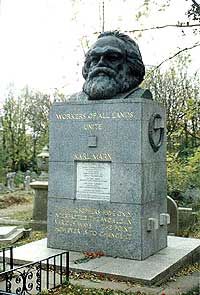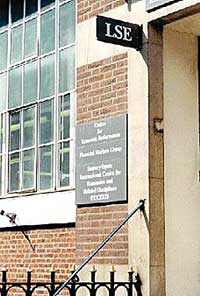 Wearing a Barbour and armed with a trusty binocular and notepad, London Eye went bird watching last week to try to catch a rare glimpse of that elusive species: 'CPN-M (London)' and its flock. Sightings in its new migratory habitat are rare because it has no distinctive markings or features on its coat or head, even in its favourite hunting grounds of South East London or sunny Royal Berkshire.
Wearing a Barbour and armed with a trusty binocular and notepad, London Eye went bird watching last week to try to catch a rare glimpse of that elusive species: 'CPN-M (London)' and its flock. Sightings in its new migratory habitat are rare because it has no distinctive markings or features on its coat or head, even in its favourite hunting grounds of South East London or sunny Royal Berkshire.
The bird sanctuary for this particular expedition was one of capitalism's premier educational institutions in central London, a stone's throw from the comrades' favourite broadcasting medium. Ironies abound.
Much to our disappointment, the CPN-M (London) did not make its appearance. But like relics from a bygone era, old Marxists were spotted in abundance still dreaming and harping on of a collective utopia. This breed seems to have failed to see through its blinkers post-1990 and 9/11. There is a new world order, Uncle Sam's hegemony.
It was surreal: sitting in the middle of London, 200 yards from the Thames, to hear stirring tirades that predicted Nepal would fall any minute and become the beacon and the inspiration for a glorious new trend across the globe for people's revolutions. The mouthpiece (probably an ex-PKK or an Iranian communist) was exhibiting traits more like his cousin from across the Tigris, Comical Ali.
It was him and not the Nepali media who was deploying the weapons of mass deception. The days of cause celebre and trendy activism like the pro-Sandinista public meetings of the 1980s are long past in London, but it looks like discussions on foreign revolutions will never be completely pass?.
o where were they, the CPN-M leaders, the diaspora cadre, during this networking opportunity? Why didn't they attend the very event organised to show international solidarity to their struggle? Do they only fly by night to meet up in some dark smoke-filled room? Even here? Do they have to be, or are they underground forming sleeper cells like other 'normal' terrorists? Or was the meeting too bourgeois? Maybe this just wasn't the habitat for our particular species of waders.
There is an unofficial estimate that a quarter of the Nepali population in London are 'Maoist-affected people'. The so-called Maoists therefore must have been busy: not with spreading the class struggle, but with the struggle of basic human survival in this wet and miserable second city of capitalism. What a bitter contradiction for comrades here in the metropolis where Marx is buried.
London, even more so than the DC belt area, is a microcosm of Nepali society. There are all here: Little Darjeeling, Little Na Tole, Little Dharan Camp, Little Durbar, Little Kaski, Little Pahad, Little Thamel, Little Kanth and Little Tibet. So there must be a Little Rolpa somewhere, too. But why don't they even appear at an international solidarity function to mark the eighth anniversary of their war?
One can only conclude that, as with other Nepali migrants, it is a desire for a better livelihood rather than ideology that is the motivational driver. Britain, therefore, is a natural migratory destination for this species. "Once all struggle is grasped, miracles are possible," Mao Zedong once said. Yes, the struggle can be grasped, not by the barrel of the gun but by the sweet incentives of global capitalism.
In all this, maybe there is a role for Britain. After all, we have strong historical links and an enduring awe and fascination of all things British by our Anglophile establishment. All this must count for something for London to leverage its position to broker a deal and rescue the country it did not want to colonise.
To take the avian analogy a bit further, they could even kill two birds with one stone: restore peace in Nepal and enhance Tony Blair's standing as a true international leader. Blair gave his deep conviction, Christian values and morals, right over wrong, as one of his guiding principles in the headlong dash to join Iraq's 'war of liberation'. Fine principles indeed, but can these principles be extended to bring peace in Nepal? Miracles do happen. But Nepal's misfortune perhaps is that it doesn't have Iraq's strategic worth.
 Pro-Maoist meet in London
Pro-Maoist meet in London The London-based World People's Resistance Movement and the Anti-Racism and Anti-Imperialism Organisation organised a public hearing to mark the eighth anniversary of the Maoist 'People's War' in Nepal.
Seventy people gathered on 18 February in a dingy little room at the London School of Economics and Political Science (LSE), but there was a genuine sense of solidarity among participants during the three-hour session. The program began with a video screening of a mass rally on 3 April 2003 organised by the Maoists at Tundikhel during the ceasefire period. The video carried the now-famous speech by Baburam Bhattarai in which he said: "We have shed too much blood, suffered inhumane torture and oppression. Now it is time for us to look forward to a brighter future, one which is filled with peace and freedom." The video was greeted with applause.
An Iranian read a paper on the people's war in Nepal and its underlying reasons, which he said were the inability of Nepal's ruling classes to meet the basic needs of the people, address inequities as well as their failure to stand up to Nepal's "hegemonistic, imperialist" neighbour, India. He also accused "imperialist powers" such as Britain and the United States of trying to undermine the Nepali revolution.
A discussion followed with a Nepali student saying he didn't believe in the Maoist ideology of violence. This provoked a long discussion on violence as a means of revolution. (Bimbika Sijapati)



